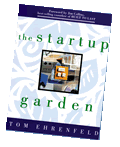
Don’t Miss Myths of Innovation Oops. It’s been quite a while since I posted—been busy completing several very large projects. I’m back, and again resolved to post more frequently. Actually, I have some changes planned for the site, which I hope to roll out over the coming months. This site is screaming for better focus, clearer promise, and more frequent engagement from yours truly. All this can I truly deliver. Eventually. In the meantime, here’s a tout: The Myths of Innovation by Scott Berkun. In the spirit of what makes his book so fun, which is to debunk innovation myths, I’ll mention three ways that his terrific book defies received wisdom. Innovation books must be long. Berkun’s book checks in at 150 pages, and even with a small trim size and many illustrations, it feels complete. He sets up ten candlepins of innovation myths and nails a strike by knocking em all down. His pithy chapters skewer the ideas that innovation is always good, or belongs to the lone inventor, or happens as a sudden epiphany. Berkun breezily reveals how new products and services are produced in a disciplined process, one that can be loosely described and certainly supported, though not always precisely replicated. Innovation books must present innovation as a holy and abstract grail-like abstraction. Berkun takes innovation down off the pedestal and puts it into the pedestrian (and that’s a good thing.) He shows how innovation in practice (indeed, all true innovation would appear to fall under this category, rendering “innovation-in-practice” a redundant turn-of-phrase) occurs “anyhow in a corner”, to crib Auden, “some untidy spot where the dogs go on with their doggy life.” Innovations don’t occur as a sudden, isolated revelation from a lone genius. Rather, Berkun shows, breakthrough ideas and products are produced in an iterative, cumulative manner by clever and resourceful individuals and teams building on the legacy of genius. Innovation books must drone on. Books on this topic really don’t have to trigger drooling trolls a la Ben Stein’s Economics Teacher in Ferris Bueller’s Day Off. Anyone? Anyone? Berkun presents his material keenly. He writes clearly and passionately, and illustrates his arguments with terrific stories and examples. I like how he shifts gears in this passage, moving from an observation about epiphany to a recommendation about what to do with it. “The best lesson from the myths of Newton and Archimedes is to work passionately but to take breaks. Sitting under trees and relaxing in baths lets the mind wander and frees the subconscious to do work on our behalf.” And here’s a longer passage I like:
Here’s what I wanted more of in the book: lessons that Berkun learned on his own. One of the strengths of this book—its varied and engaging sources—becomes a bit of a weakness by the end. It’s almost too book-ish. I wish Berkun would simply assert some of the truths that he proves with a surplus of lovely references. We know that the author has led a team at Microsoft; surely he has a few of his own lessons, gleaned from experience, to round out the list. An interview or two with other folks would help him own the argument more directly and powerfully. To prevent ending on a minor quibble. I’ll note another terrific element of this book. In a short, sharp, annotated bibliography Berkun explains why gems like Peter Drucker’s Innovation and Entrepreneurship (one of my all-time favorite business books), Mihaly Csikszentmihalyi’s Creativity: Flow and the Psychology of Discovery and Invention, and Joseph Campbell’s The Power of Myth are required reading. And for even more of his recommendations and insights, visit his excellent website. Posted by tom at September 10, 2007 10:21 PMComments
Post a comment
|
Recent Writing Flow as the Grand Unifying Theory of Productivity Lowering the Personal Entrepreneurial Threshold Good Writing Begets Good Writing
THE BOOK
Read or print the Intro and
Read some book reviews at Inc, 1-800-CEO-READ, and the Miami Herald. Read the publisher's press release. Visit the companies that Tom discusses in the book Hear a recent lecture by Tom on the Startup Garden STARTUP RESOURCES Read about other books and web sites about starting your own business. TOM'S WRITING Just Managing – articles that Tom wrote for The Industry Standard and some Business Articles written for Inc., Fortune Small Business, Harvard Management Update, and other places. BUY THE BOOK To buy directly from me, simply go to Paypal and send 15 bucks to Tom@startupgarden.com. I'll take care of the rest. If you have any questions, email me at that address. |
| © 2001-2003 Tom Ehrenfeld | Site design by Tim Swan | |
